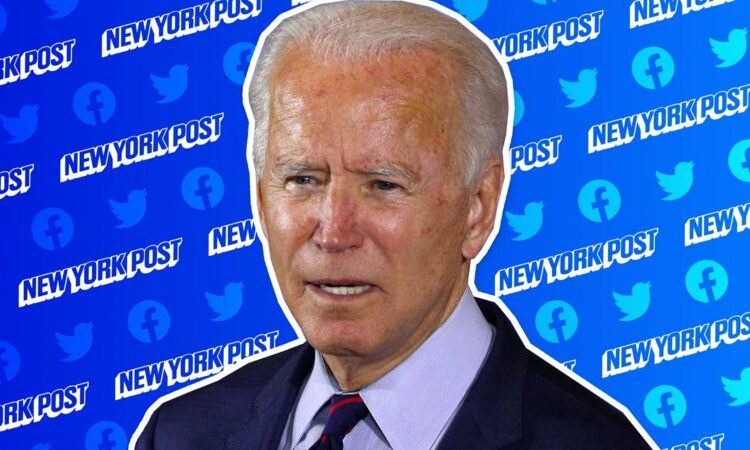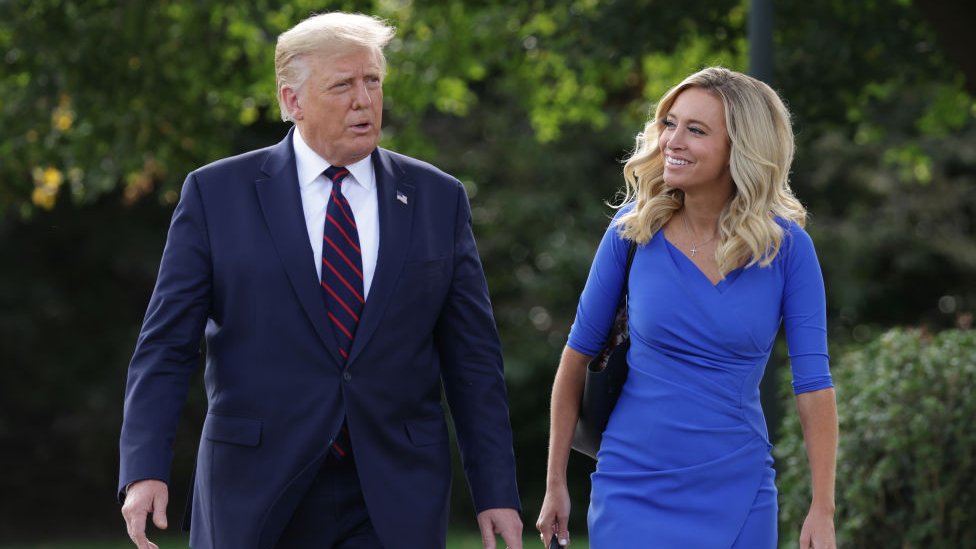
By Chris Fox
Technology reporterI
The way Twitter communicated its handling of a controversial article about US presidential hopeful Joe Biden was “unacceptable”, its chief has said.
On Wednesday, Twitter prevented people from posting links to a New York Post story, warning those trying to click it that the link was “potentially unsafe”.
It only later explained it had limited sharing because the story contained “hacked materials”.
Facebook also took action, limiting the report’s distribution in its news feed.
It said it had done this as part of a “standard process” to give third-party fact-checkers time to review the content and decide if it should be treated as misinformation.
However, it is highly unusual for an article published by one of the mainstream popular newspapers to be treated in this way.
It is now less than three weeks until Mr Biden, the Democratic candidate, faces the Republican incumbent Donald Trump in the presidential election on 3 November.
The moves by Twitter and Facebook have renewed accusations of social media censorship and bias.
Jack Dorsey, Twitter’s chief executive, acknowledged that it should have informed users as to why it had intervened sooner.
“Our communication around our actions on the @nypost article was not great. And blocking URL [website link] sharing via tweet or DM [direct message] with zero context as to why we’re blocking: unacceptable,” he tweeted.
The New York Post article contained screenshots of emails allegedly sent and received by Hunter Biden, Joe Biden’s son.
It also contained personal, intimate photos of Hunter Biden, allegedly taken from a laptop computer that was given to a repair shop.
Twitter said discussing the claims in the New York Post article was not against its rules, but it had imposed restrictions on the article because it exposed private information such as email addresses and exposed material obtained by “hacking”.
What was the article about?
The article focused on an email from April 2015, in which an adviser from a Ukrainian energy company apparently thanked Hunter Biden for inviting him to meet Joe Biden in Washington.
It did not provide evidence that the meeting ever took place, and the Biden election campaign says it did not.
Hunter Biden joined the board of directors of the energy company in 2014, while his father was US vice-president. He stepped down from the company in 2019.
“We have reviewed Joe Biden’s official schedules from the time and no meeting, as alleged by the New York Post, ever took place,” it said.
“Investigations by the press, during impeachment, and even by two Republican-led Senate committees whose work was decried as ‘not legitimate’ and political by a GOP colleague, have all reached the same conclusion: that Joe Biden carried out official US policy toward Ukraine and engaged in no wrongdoing,” said Andrew Bates, a spokesman for Mr Biden.
“Trump administration officials have attested to these facts under oath.”
The emails and photos of Hunter Biden were allegedly obtained from a MacBook Pro that was taken to a repair shop in April 2019.
The device was never collected by its owner, but the store owner made a copy of the hard drive.
What did Twitter do?
On Wednesday, Twitter stopped people from posting links to the article, and would display an error message saying: “We can’t complete this request because this link has been identified by Twitter or our partners as being potentially harmful.”
People were also stopped from sending the article in a private direct message, and they were warned that the link was “potentially unsafe” if they tried to click it or retweet a copy that had already been posted on Twitter.
Twitter has now explained that the article violated its private information policy, and its hacked material policy.
The New York Post article contained screenshots of Hunter Biden’s emails that exposed personal email addresses.
It also contained personal and intimate photographs of Hunter Biden which had been taken from the copied hard drive, the New York Post said.
Twitter said discussing the article or the allegations made in it was not against its rules.
Twitter said: “We know we have more work to do to provide clarity in our product when we enforce our rules in this manner.”

The battle escalates

This is the latest escalation in two battles. The first is social media’s fight against misinformation – especially ahead of the US election.
Pressure has been growing on Twitter and Facebook to tackle political disinformation and interference – but this raises big questions about how much they should or should not do.
This is the first time Twitter has so comprehensively limited the spread of information from a mainstream news outlet.
For Facebook, it is less of a departure. It often slows down the spread of stories when there are questions about their veracity, so that third-party fact checkers can have a look.
The second battle going on here is between the companies – especially Twitter – and President Trump.
The president and his supporters have repeatedly accused Big Tech of silencing right-wing voices – and this latest move will fuel those claims.
Twitter chief Jack Dorsey explained how the company’s action was driven by concerns about private details in the story, and the network’s rules about hacked material.
But given that its reasoning was not explained immediately, Republicans have been left outraged at Twitter’s move.

How have people reacted?
Twitter’s actions have fuelled claims that social networks are biased against conservatives.
US President Donald Trump tweeted: “So terrible that Facebook and Twitter took down the story of ‘Smoking Gun’ emails.”
The president also told a rally that Twitter had locked the personal account of White House press secretary Kayleigh McEnany “for reporting the truth” after she shared details of the New York Post’s article. The BBC has asked Twitter for comment.
 IMAGE COPYRIGHT GETTY IMAGES
IMAGE COPYRIGHT GETTY IMAGESThe president has also repeated a call to “repeal section 230”, a legal protection that stops websites being held responsible for what their users post.
Mr Trump has previously indicated that he would like social media websites to be treated as publishers, if they exercise control over what users are allowed to post.
The New York Post itself has accused the social networks of promoting the Biden campaign, publishing an editorial in which it claimed: “Facebook and Twitter are not media platforms. They’re propaganda machines.”
The official Twitter account for the Republican members of the House Judiciary Committee tweeted they had posted a copy of the New York Post article on their own website and encouraged users to share a link to it.
Twitter now also prevents users from posting this link.
